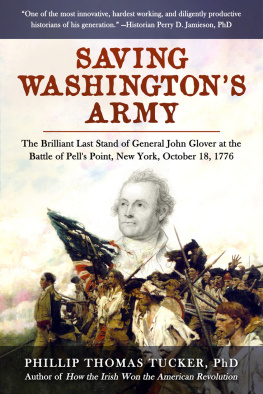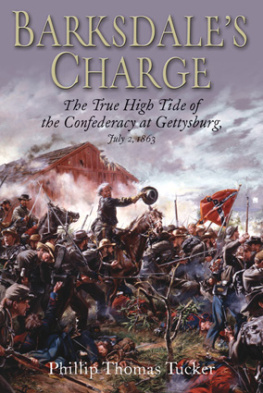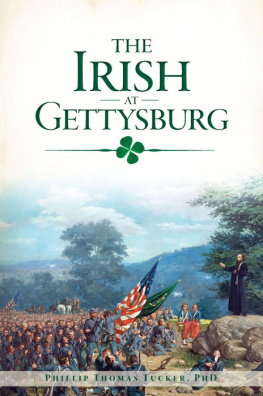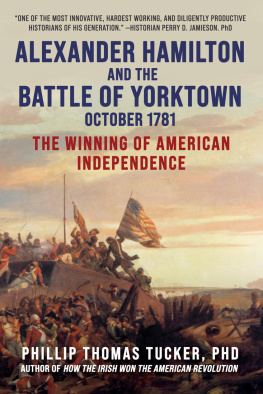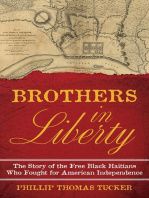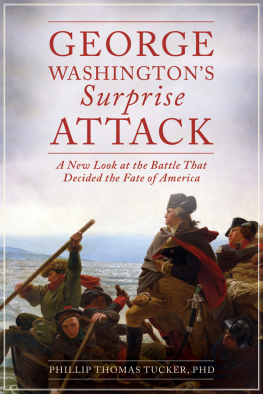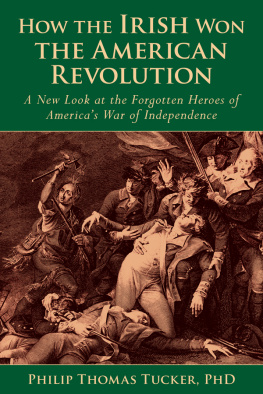Phillip Thomas Tucker - Saving Washingtons Army
Here you can read online Phillip Thomas Tucker - Saving Washingtons Army full text of the book (entire story) in english for free. Download pdf and epub, get meaning, cover and reviews about this ebook. year: 2022, publisher: Skyhorse, genre: History. Description of the work, (preface) as well as reviews are available. Best literature library LitArk.com created for fans of good reading and offers a wide selection of genres:
Romance novel
Science fiction
Adventure
Detective
Science
History
Home and family
Prose
Art
Politics
Computer
Non-fiction
Religion
Business
Children
Humor
Choose a favorite category and find really read worthwhile books. Enjoy immersion in the world of imagination, feel the emotions of the characters or learn something new for yourself, make an fascinating discovery.
- Book:Saving Washingtons Army
- Author:
- Publisher:Skyhorse
- Genre:
- Year:2022
- Rating:4 / 5
- Favourites:Add to favourites
- Your mark:
- 80
- 1
- 2
- 3
- 4
- 5
Saving Washingtons Army: summary, description and annotation
We offer to read an annotation, description, summary or preface (depends on what the author of the book "Saving Washingtons Army" wrote himself). If you haven't found the necessary information about the book — write in the comments, we will try to find it.
Saving Washingtons Army — read online for free the complete book (whole text) full work
Below is the text of the book, divided by pages. System saving the place of the last page read, allows you to conveniently read the book "Saving Washingtons Army" online for free, without having to search again every time where you left off. Put a bookmark, and you can go to the page where you finished reading at any time.
Font size:
Interval:
Bookmark:



Copyright 2022 by Phillip Thomas Tucker
All rights reserved. No part of this book may be reproduced in any manner without the express written consent of the publisher, except in the case of brief excerpts in critical reviews or articles. All inquiries should be addressed to Skyhorse Publishing, 307 West 36th Street, 11th Floor, New York, NY 10018.
Skyhorse Publishing books may be purchased in bulk at special discounts for sales promotion, corporate gifts, fund-raising, or educational purposes. Special editions can also be created to specifications. For details, contact the Special Sales Department, Skyhorse Publishing, 307 West 36th Street, 11th Floor, New York, NY 10018 or .
Skyhorse and Skyhorse Publishing are registered trademarks of Skyhorse Publishing, Inc., a Delaware corporation.
Visit our website at www.skyhorsepublishing.com.
10 9 8 7 6 5 4 3 2 1
Library of Congress Cataloging-in-Publication Data is available on file.
Cover design by Kai Texel
Print ISBN: 978-1-5107-6937-3
Ebook ISBN: 978-1-5107-6938-0
Printed in the United States of America
Dedicated to Willard Thomas Tucker
Contents
Introduction
In one of the great ironies and most glaring omissions of the American Revolution, one of the most important battles of Americas struggle for independence has remained virtually unknown to this day nearly two and a half centuries later. Compared to the famous New Jersey showdowns at Trenton and Princeton during the winter 17761777 campaign, and then at Saratoga, New York, in October 1777, very few Americans, including even Revolutionary War historians, have ever heard anything about the crucial Battle of Pells Point, New York, which raged on Friday October 18, 1776. To ensure additional obscurity, this key battle fought just northeast of New York City has been long erroneously called the Battle of Pelham Bay and Pelham Heights, when this crucial engagement took place at neither location.
Exactly how important was this long-overlooked Battle of Pells Point which was fought in a remote part of Westchester County, New York, just on the east side of Long Island Sound northeast of New York City? The longtime omission of the Pells Point battle from the annals of Revolutionary War historiography has been extremely surprising, because no chapter of American history has been more romanticized and glorified than the American Revolution, especially the campaigns of General George Washington and American victories. Without adequate military experience or training at a military school or academy, Washington had relatively little realistic chance of achieving victory when facing the experienced professionals of the vastly superior British Army, which was fully demonstrated throughout the disastrous New York Campaign of 1776. In fact, Washington and his army only survived by the narrowest of margins on numerous occasions during this fiasco of a campaign in which he attempted in vain to defend New York City, which was an absolute impossibility.
Thanks to the demands of the political amateurs in the Continental Congress, General Washingtons ill-fated defense of New York City during the disastrous summer of 1776 was a textbook example of ineptitude, because he made so many poor leadership judgments and decisions. Washington lost the Battle of Long Island on August 27 and then escaped with much of his army across the East River by the narrowest of margins to Manhattan Island on the night of August 2930, thanks largely to the efforts of Colonel John Glovers mariners, mostly from Marblehead, Massachusetts, who rowed thousands of Washingtons troops to safety during the night. It was only a matter of time before Americas most prosperous port city fell. Forced to hastily evacuate New York City, Washington suffered one of the greatest disasters of the American Revolution in the early part of mid-September 1776, when he lost New York City to the superior forces of General William Howe.
Thereafter, the city served as the vital nerve center of the British military effort to subdue the wayward colonies for the wars remainder, thanks to its excellent deepwater port for British warships, which could strike anywhere along the Atlantic coast. But to be fair, Washington never had a realistic chance of successfully defending Americas most important city, because it was surrounded by a maze of tidal rivers, narrow peninsulas, inlets, sounds, channels, and straits that had been carved out by the advance and retreat of glaciers millions of years before. During the New York Campaign, Washington faced nothing less than the most powerful navy in the world, when America had no navy in the area to counter the dominance.
The struggle for possession of New York CityAmericas second-largest city after the capital, Philadelphia, Pennsylvaniawas of unparalleled strategic importance from the wars beginning. Washington lusted to capture the city for most of the war, including even at the beginning of the Yorktown Campaign during the spring of 1781. Washington was only reluctantly convinced by sound advice from French leaders to embark on the long march south with the French army to Yorktown, where American independence was won in October 1781. Washingtons longtime obsession of capturing New York City had nearly wrecked the opportunity to capture Lord Cornwallis and his entire army on the Virginia Peninsula. Well into 1781, Washington had erroneously considered that the capture of New York City was the key to winning the war instead of operations in his home state of Virginia.
To be fair, Washingtons strategic obsession was somewhat justified. New York City and the surrounding area were decisive ground from the American Revolutions beginning to the end. As noted, Washington lost New York City during the summer of 1776 to a mighty British invading force of 427 sailing ships with more than thirty thousand troops, the largest armada ever dispatched by England; Washington met the best-trained professional military in the world with only a ragtag army of around twenty thousand ill-equipped and poorly trained amateurs in rebellion and never had a chance.
Washington witnessed a whole series of fiascos largely of his own making around New York City, which were inevitable because of his lack of experience and his opponents vast superiority on land and water. At Manhattan Island and then later in Westchester County just northeast of New York City, the fate of Washingtons army and Americas idealistic vision of a New Israel hung precariously in the balance during the early fall of 1776. Washington faced one crisis after another until a large portion of his army belatedly escaped from Long Island to Manhattan Islandwhich was a death-trapand then withdrew north to the relative safety of Harlem Heights, New York.
Great Britains most powerful expeditionary force in its lengthy history of invading foreign lands, especially nearby Ireland, missed still another golden opportunity to not only destroy Washingtons fledgling army, but also to end the revolution in one stroke, because of what Colonel John Glover and his undersized Massachusetts brigade of four Continental regiments achieved against the odds of more than seven to one on October 18, 1776.
Howes determined effort to encircle Washingtons army and destroy Massachusetts Governor John Winthrops idealistic dream of a City on a Hill not long after New York Citys evacuation was frustrated by Colonel Glover, age forty-three, during the hard-fought Battle of Pells Point. The persistent tendency to refer to the significant October 18 clash of arms as the Battle of Pelham Bay has caused some confusion about a land battle that was certainly not a naval action.
Next pageFont size:
Interval:
Bookmark:
Similar books «Saving Washingtons Army»
Look at similar books to Saving Washingtons Army. We have selected literature similar in name and meaning in the hope of providing readers with more options to find new, interesting, not yet read works.
Discussion, reviews of the book Saving Washingtons Army and just readers' own opinions. Leave your comments, write what you think about the work, its meaning or the main characters. Specify what exactly you liked and what you didn't like, and why you think so.

